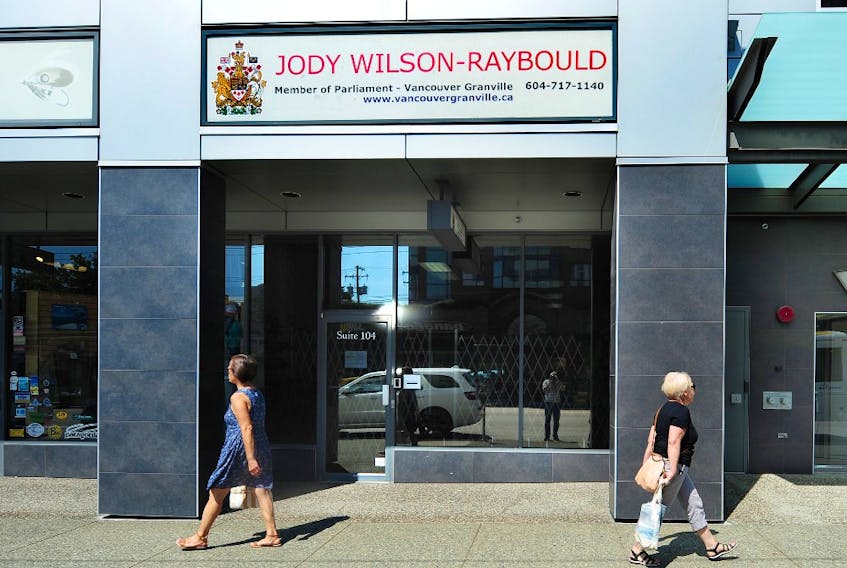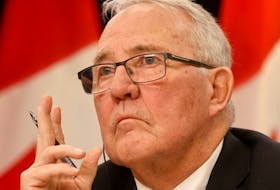How to solve a problem like Jody?
In his submission to the ethics commissioner’s investigation into the SNC affair, Justin Trudeau said his relationship with Jody Wilson-Raybould had become challenging and tense.
His counsel claimed she felt collaboration with Trudeau’s office and cabinet was not something she should have to do.
By many accounts, Wilson-Raybould did not play well with others. At the time SNC’s push for a deferred prosecution agreement was becoming an issue in fall 2018, another issue was causing friction between the then attorney general and her colleagues — the government’s proposed legislative framework on Indigenous rights.
Trudeau had proposed that he would recognize Indigenous rights, rather than have Indigenous people have to claim them. Crown-Indigenous Relations Minister Carolyn Bennett was the lead member of cabinet on the file but Wilson-Raybould was a key voice at the table. The problem was that her views did not coincide with Bennett’s.
The justice minister wrote what one person with knowledge of the file called a “blistering” letter to her cabinet colleagues “tearing a strip off Carolyn’s proposal in rather inflammatory language.” Wilson-Raybould was even said to be encouraging the Assembly of First Nations to oppose Bennett’s plan, which many chiefs did.
“She was flirting with a breach of cabinet solidarity all the way through September and October and colleagues like (Bill) Morneau, (Dominic) LeBlanc, (Jonathan) Wilkinson and (Catharine) McKenna were becoming increasingly exasperated with her,” said the person. “Jody always kind of wanted to drive the bus from the seat behind the driver.”
This was the backdrop against which the SNC saga played out and it is a fair assumption that it coloured Trudeau’s judgment, and that of his senior advisers, as they grappled with the SNC dilemma.
To their mind, she was proving equally obstructive on SNC as she was on Indigenous rights.
The government had decided to craft legislation on deferred prosecution agreements specifically to resolve SNC’s legal woes. The provision was duly buried in an omnibus budget to avoid parliamentary scrutiny and ease its passage (quite how the public service allowed this to happen without an unholy row is the subject for another day).
Wilson-Raybould indicated her aversion to the tactic of rushing through the legislation by refusing to propose it in cabinet or speak to it in public.
By this stage, as Trudeau’s counsel told the ethics commissioner, the prime minister believed the attorney general saw any form of engagement or advice as “interference.”
That mindset appears to have persuaded him to try to “circumvent, undermine and ultimately discredit” Wilson-Raybould’s authority as the government’s chief legal officer, in the words of Mario Dion, the ethics commissioner, as part of his damning report that found the prime minister guilty of breaching the Conflict of Interest Act.
Yet, if Wilson-Raybould was not the martyr some have painted her, in this case, she was right. A dispassionate view of the legal facts, at least as laid out by Dion, suggests her decision to back the director of public prosecutions ruling not to give SNC a remediation agreement was the correct one.
Canada’s Criminal Code states that for offences committed under the Corruption of Foreign Public Officials Act, prosecutors must not consider the national economic interest or the potential effect on relations with other states, over fears that bribery be offered as a requirement to protect export markets. Dion referenced a similar case in the U.K., where engine maker Rolls Royce was seeking a deferred prosecution agreement, on the basis that a conviction would have an adverse impact on Britain’s defence industry. The judge ruled the national economic interest was “irrelevant” and that companies that commit serious crimes should expect to be prosecuted.
In that context, it’s hard to see how Wilson-Raybould could have justified overturning the DPP’s decision, regardless of any arguments to the contrary made by the former Supreme Court justices on SNC’s payroll.
Trudeau should have used his parliamentary majority to change the law, rather than ride roughshod all over it. His counsel argued that potential job losses and the repercussions on pensioners did not necessarily constitute the national economic interest. A Criminal Code amendment would have clarified the point and, potentially, avoided a political firestorm that may yet engulf this government. But a different course of action was taken — one that led to a breach of the federal ethics laws and a prime minister sucking and blowing at the same time over whether he was sorry or not.
It is fair to speculate that a more measured response was not attempted because Trudeau and his advisers had already resolved that the attorney general was an intractable, hostile presence who needed to be removed — a problem that had to be circumvented, undermined and, ultimately, discredited.
[email protected]
Twitter.com/IvisonJ
Copyright Postmedia Network Inc., 2019









